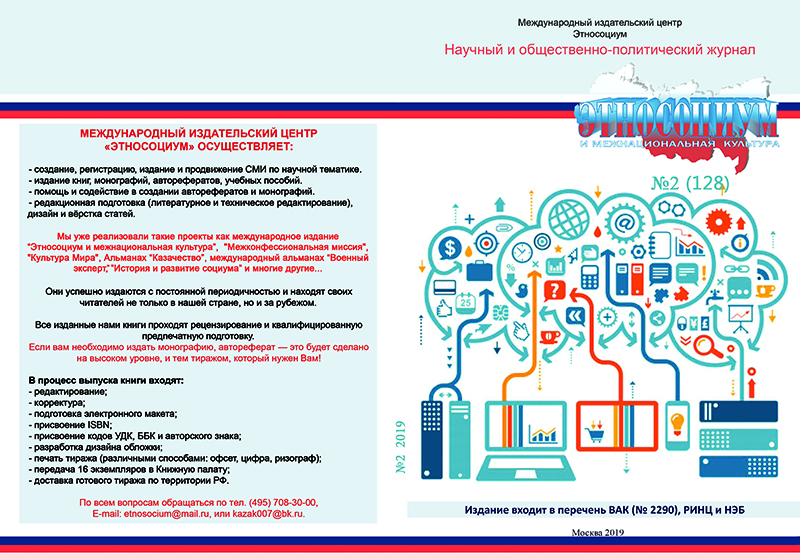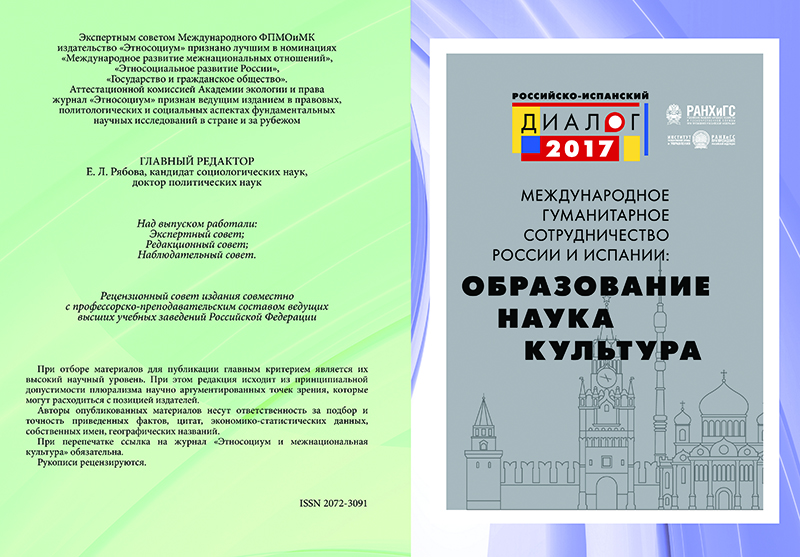

Content
|
COUNCIL OF INTERNATIONAL RELATIONSHIP
|
|
|
Remarchuk V.N. Management of meanings as a tool of current policy: technologies and probable consequences
|
9
|
|
Fotina L.V., Kemenev D.A. Mentoring as a basic personnel technology in the civil service system: еthnosocial factor
|
22
|
|
ACTUAL PROBLEMS OF MODERN SOCIETY:
POLITICS, ECONOMICS, LAW
|
|
|
Bormotova T.M., Khodzich M.V. Strategic analysis in the migration sphere of the Russian Federation: problems and their solutions
|
37
|
|
Voznesenckiy I.S. Social stratification and organization of labor in the temporal dimension
|
47
|
|
Laminina O.G., Mahlueva O.V. The main risks of modern social networks
|
56
|
|
REGIONAL STUDY:
POLITICS, ECONOMICS, LAW
|
|
|
Adamova M.A., Mankieva A.V., Sergeev S.I., Shabanova E.A. Topical aspects of the use of internet technologies by terrorist and extremist organizations
|
63
|
|
INTERNATIONAL RELATIONSHIPS:
POLITICS, ECONOMICS, LAW
|
|
|
Ryabova E.I., Ternovaya L.O. Geopolitics 4.0: history, first steps, opportunities
|
69
|
|
Danakin N.S., Pitka S.N. Terms of foreign students adaptation in Russian universities
|
78
|
|
Ivanova A.Y. Stereotypic images of Russia and China
|
89
|
|
Li Eryong The distribution and influence of bel canto in Chinese vocal music of the twentieth century
|
99
|
|
Ormonova A.T. Development stages of political cooperation between Kyrgyzstan and South Korea
|
106
|
|
Chapkin N.S., Brik T.A. Social hairdryer and technology: IgroMir
|
114
|
|
NEWS
|
|
|
Zorin V.U. Migration policy: between human rights and security
|
121
|
|
Abstracts
|
131
|
|
Authors
|
142
|
|
Requirements to materials submitted to the international publishing house "Etnosocium"
|
145
|
The article analyses the role and the effects of political insights on the State through the information and communication sphere of the Society and the probable consequences of such an effect. It should be particularly emphasized that the ensuing information and cognitive Warfare in its various forms has an irreversible effect on the Society. Special attention is being paid to the consequences of a similar effect. The recommendations to stand-off the War of insights are being proposed under present-day conditions.
Keywords: globalization, analytical information, social communications, insights, management of insights, information and communication sphere, information war, cognitive warfare.
The article examines the problem of the institutionalization and development of mentoring in the civil service system. The ethnosocial factor of the institutionalization of mentoring as a personnel technology in the civil service personnel management system is substantiated. Through mentoring, the civil servants also upgrade their regional socio-cultural competences, which is especially important in a multinational Russian state. The author suggests a structural-logical scheme of mentoring as a basic personnel technology, which makes possible to uncover its personnel and technological potential in conjunction with other technologies. The main requirements for this personnel technology are determined to ensure its effectiveness.
Keywords: mentoring, institutionalization of mentoring, regional aspects of mentoring, public service, professionalization of public service, personnel technologies, basic personnel technology.
The authors consider the existing planning system in the bodies of Internal Affairs of the Russian Federation, which allows to provide organizationally the main directions of operational activities, in which there are elements of strategic planning. Its organization consists in development of the administrative decision on the basis of generalization, systematization and the analysis of the necessary information for development of the plan; collecting the offers of interested bodies, the organizations and divisions coordinated in accordance with the established procedure, their structural divisions; preparation and the subsequent approval with them of the draft of the plan; approval of its head and bringing to the interested bodies (divisions). The main purpose of the strategic analysis is to find the most stable laws and trends in each process, which can play a decisive role in ensuring the social security of society from the challenges and threats of crime. Analysis of information processes that form the basis of management are the only possible explanation for the fact of preservation of the organization of systems indicates the continuous flow of information to them, characterizing both the phenomena occurring in the world and the processes occurring in these systems.
This allows the planning process to determine the strategic goals and objectives of the Department in the field of migration. First of all, improvement of information and analytical support of migration management is seen in strengthening the strategic component in this subsystem.
Keywords: strategic planning, strategic analysis, information and analytical support in the management of migration processes, strategic analysis of the migration sphere.
One of the most striking manifestations of social heterogeneity of society is social stratification. In modern conditions, a triad consisting of space, time and values is added to the traditional criteria of social stratification, which are income, power, education, prestige. All of them, but primarily the criterion of time, taking into account the peculiarities of this most important vital resource, are aimed at giving social stratification greater flexibility, and providing an individual with conditions not only for his social advancement, but also for increasing his personal efficiency.
Keywords: social stratification, work organization, economic behavior, human-oriented economy, time, time management.
This article describes the main risks associated with the use of social networks by employees of various organizations. The authors consider the importance and necessity of alerting employees about possible dangers and give recommendations to reduce the likelihood of cyberattacks using social engineering methods.
Keywords: cyber attacks, hacking, security, social networks, information, account, cybercriminal.
The deeply engrained natures of social media in modern life have provided ease of access to information and speed of use within almost every aspect of a person’s life. These same benefits are also available to terrorists and their organizations. The same technology that allows for a globalized world to interact without regard for distance or physical location is also utilized, exploited and adapted to by terrorist organizations to conduct operations and reach candidates.
Keywords: Internet, terrorist and extremist activities, ideology of terrorism, propaganda of extremist ideology.
The article raises the problem of expressing the geopolitical aspirations of various participants in international relations in doctrinal form. This corresponded to the spirit of the initial stages of geopolitics, but is not acceptable for its present stage, which can be called hyperspatial geopolitics or geopolitics 4.0. It reflects modern global realities with their complexities of international communication, but at the same time opens up the possibility of more full participation in international life not only of elites, but ordinary citizens.
Keywords: geopolitics, international relations, doctrine, ideology, hegemonism, geohistory.
The article presents the results of a sociological study in terms of foreign students adaptation in Russian universities. There are six groups of conditions: natural-climatic, housing, gastronomic, valeological, material, social. Comparatively more problems and difficulties arise with adaptation to natural and climatic conditions and living conditions in the dormitory. Most foreign students have financial difficulties, every fourth or fifth - problems with poor health. Many of them are exposed to racial discrimination, their rights are violated in the service sector.
Keywords: foreign students, Russian university, adaptation, natural and climatic conditions, housing conditions, health, racial discrimination.
The subject of the research is the identification and construction of stereotypes in the intercultural communication of Russia and China. The purpose of the work is to identify the cultural and historical determinants of the birth, formation and transformation of stereotypical images of Russia and China. The study is based on a retrospective method, a theoretical analysis of scientific literature, as well as a descriptive method that facilitates the transfer of specific features of reminiscences that serve as carriers of cultural information. In addition, the work employs an empirical research method based on a questionnaire survey in which the free description technique is carried out. As a result of the work, it turned out that if stereotypical images of Russia in China were influenced by historical transformations, changes in political paradigms, transformation of the social environment and social ideology, then images of China in Russia took shape in the mental, social and economic field. Accordingly, considering the stereotypical images of Russia in the Chinese consciousness, the author carries out periodization of their transformations with the allocation of six fundamental historical stages. At the same time, the stereotypical images of China in Russia in this study are evaluated and characterized on the basis of a sociological survey, the results of which revealed a rather positive attitude of Russian youth to China - as a strategic partner of our country, a key figure in the international arena and a state with a booming economy. The results of the study are of practical and practical importance and can be applied in further studies on the intercultural communication of Russia and China, and also be taken into account in the process of forming an international image and developing a strategy for the development of relations between the two states. Thus, the article is aimed at the actualization of positive stereotypical images of Russia and China, the rapprochement of two authentic cultures, the resolution of intercultural contradictions.
Keywords: intercultural communications, stereotypical images, China, Russia, international relations, globalization, national image, historical retrospective, sociological survey, international image.
The article analyzes Bel Canto as a heterogeneous culture, it has spread and developed in the collision and integration with traditional chinese culture. It is now deeply integrated into the chinese culture of vocal music, and has become an important part of the culture of chinese vocal music. Its spread deepened our understanding of western culture, contributed to the development of chinese professional vocal performances and vocal music education, and played a positive role in the formation of the modern national school of vocal music and the creation of works of vocal music.
Keywords: distribution and influence, Bel Canto, Chinese vocal music.
The article discusses the political cooperation between Kyrgyzstan and South Korea from 1992 to 2017. The Aim of this study was to determine the development of political cooperation between the Kyrgyz Republic and the Republic of Korea. There are three stages of political cooperation between the two countries for 26 years of cooperation.
Keywords: Kyrgyzstan, South Korea, politics, cooperation, development stages.